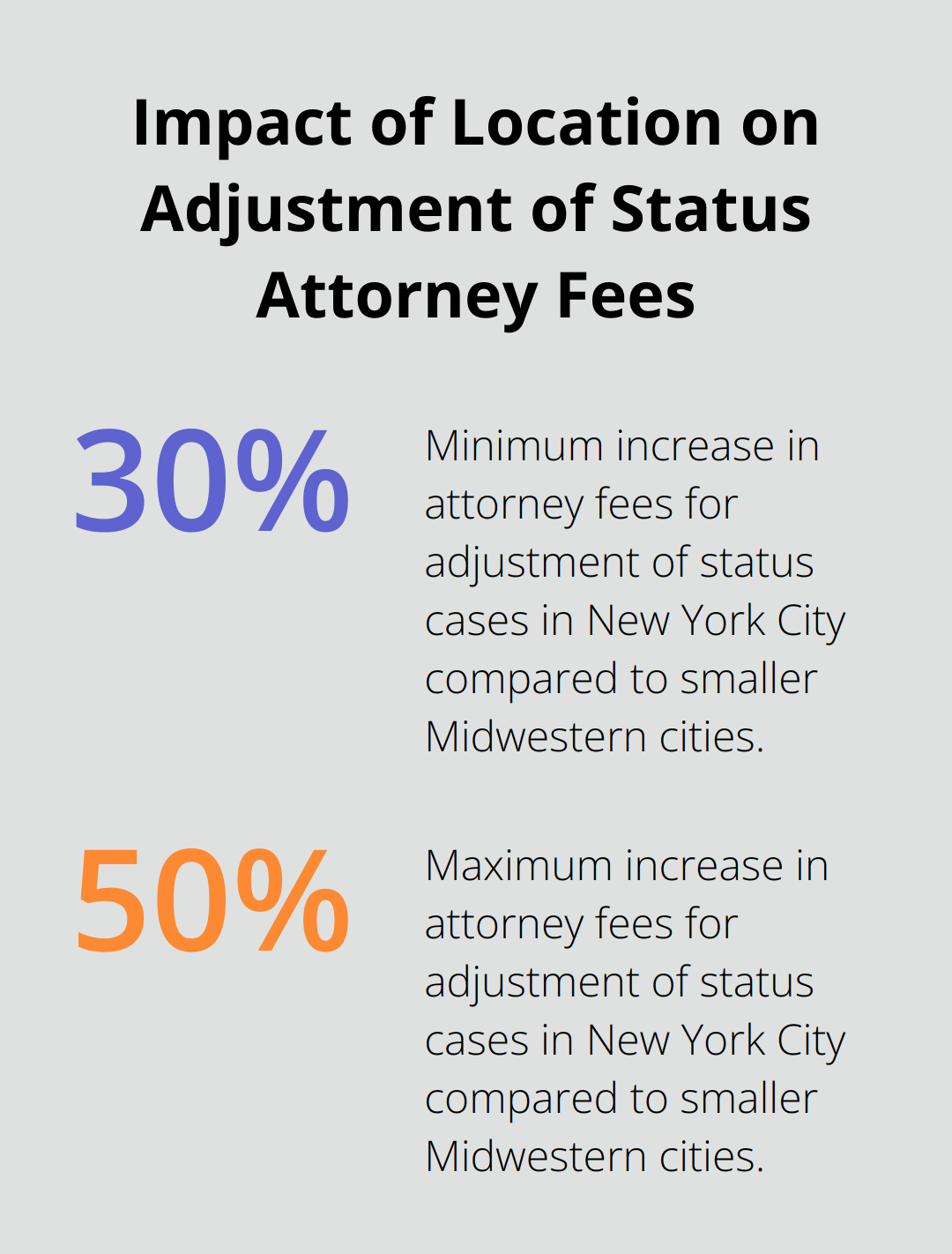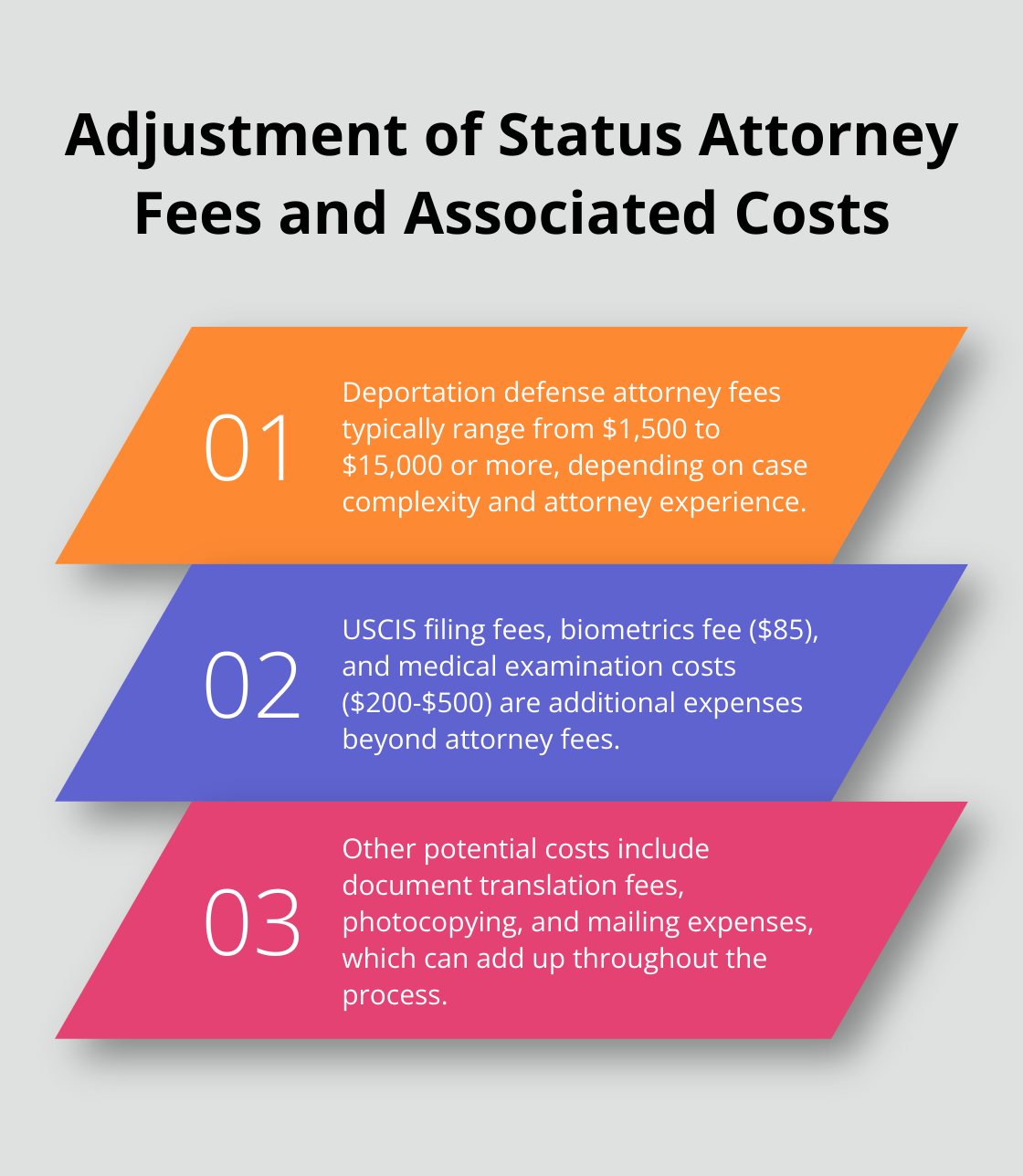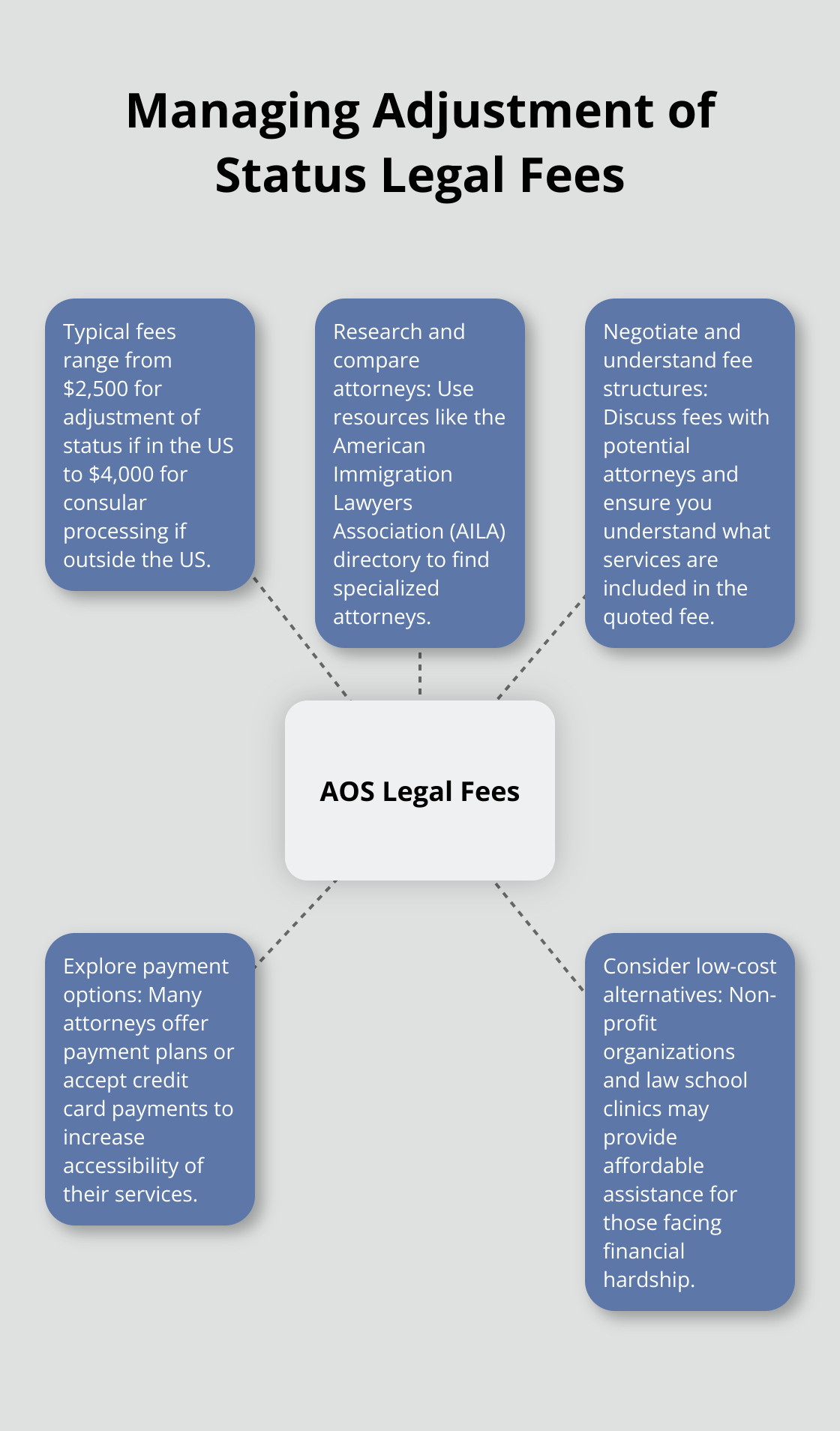
How to Navigate Adjustment of Status Attorney Fees
Navigating the complexities of immigration law can be daunting, especially when it comes to understanding adjustment of status attorney fees. At Law Offices of Jeffrey A. Thompson, we recognize the importance of clear guidance in this area.
The cost of legal representation for adjustment of status cases varies widely, influenced by factors such as case complexity and attorney experience. This post will break down typical fee structures and provide strategies for managing these expenses, helping you make informed decisions about your immigration journey.
What Impacts Adjustment of Status Attorney Fees?
Understanding Adjustment of Status
Adjustment of status allows eligible individuals to apply for lawful permanent resident status without leaving the United States. This legal procedure changes a person’s status from nonimmigrant to immigrant while they remain in the country.
Legal representation proves essential in this process due to its complexities. An experienced immigration attorney can significantly increase the chances of a successful outcome.
Case Complexity
The complexity of an adjustment of status case primarily influences attorney fees. Cases involving criminal records, prior immigration violations, or multiple visa changes typically require more time and expertise, resulting in higher fees. For example, a straightforward marriage-based adjustment might cost less than an employment-based case with labor certification requirements.
Attorney Experience and Reputation
An attorney’s experience level and reputation in immigration law can significantly impact their fees. Highly experienced attorneys or those with a track record of success in complex cases often charge more. However, their expertise can prove invaluable in navigating challenging situations or expediting the process.
Geographic Location
Attorney fees can vary widely based on geographic location. Urban areas with higher costs of living (such as New York City or San Francisco) typically have higher legal fees compared to smaller cities or rural areas. The average attorney fee for an adjustment of status case in New York City might be 30-50% higher than in a smaller Midwestern city.

Included Services
The scope of services included in the fee can greatly influence the overall cost. Some attorneys charge a comprehensive flat fee that covers all aspects of the case, from initial consultation to final resolution. Others may charge separately for additional services such as responding to Requests for Evidence (RFEs) or attending USCIS interviews. It’s important to understand exactly what services are included in the quoted fee to avoid unexpected costs later in the process.
As we move forward, we’ll explore the various fee structures attorneys use for adjustment of status cases, providing you with a clearer picture of what to expect when seeking legal representation.
How Much Do Adjustment of Status Attorneys Charge?
Flat Fee Arrangements
Many immigration attorneys offer flat fee arrangements for adjustment of status cases. This structure involves a predetermined amount for the entire process. Deportation defense attorney fees typically range from about $1,500 on the very low end up to $15,000 or more. This approach provides clarity and helps clients budget effectively.
Flat fees often cover initial consultations, document preparation, and representation throughout the adjustment process. However, it’s important to clarify what’s included. Some attorneys might charge extra for responding to Requests for Evidence (RFEs) or attending USCIS interviews.

Hourly Billing Rates
While less common for straightforward adjustment of status cases, some attorneys bill hourly. Rates can vary significantly based on location and experience, ranging from $150 to $500 per hour. Urban areas like New York or Los Angeles tend to have higher rates.
Hourly billing can lead to unpredictable costs, potentially resulting in higher overall expenses for complex cases. However, it might prove more cost-effective for simple cases that require minimal attorney time.
Additional Costs and Expenses
Beyond attorney fees, clients need to budget for various expenses associated with the adjustment of status process. These include:
- USCIS filing fees: Separate filing fees for Form I-485 (adjustment of status).
- Biometrics fee: $85 for fingerprinting and background checks.
- Medical examination: Typically $200 to $500 (depending on location and required vaccinations).
- Document translation: Required for supporting documents not in English.
- Photocopying and mailing costs: Minor but can add up.
It’s important to discuss these additional expenses with your attorney upfront to avoid surprises. Some law firms provide detailed breakdowns of all potential costs during initial consultations.
Value vs. Price
When selecting an attorney, consider the overall value rather than just the lowest price. An experienced attorney might charge more but could potentially save you money by avoiding costly mistakes or delays in your adjustment of status process.
Transparency in Fees
Try to find an attorney who practices transparency in their fee structure. Clear communication about costs from the outset can help build trust and prevent misunderstandings later in the process.
As we move forward, we’ll explore strategies for managing these attorney fees and finding affordable legal representation for your adjustment of status case.
How to Manage Adjustment of Status Attorney Fees
Research and Compare Attorneys
Start your search for attorneys who specialize in adjustment of status cases. The American Immigration Lawyers Association (AILA) offers a directory of immigration attorneys, which serves as a useful starting point for finding legal help. Compare fees, but don’t overlook experience and success rates. A more experienced attorney might charge higher fees but could potentially save you money by avoiding costly mistakes or delays.
Negotiate and Understand Fee Structures
Don’t shy away from discussing fees with potential attorneys. Some may be open to negotiation, especially for straightforward cases. Ask about different fee structures – while flat fees are common, some attorneys might offer hourly rates for simpler cases. Make sure you understand exactly what services are included in the quoted fee (e.g., responding to Requests for Evidence or attending USCIS interviews).
Explore Payment Options
Many immigration attorneys offer payment plans to increase the accessibility of their services. These plans typically allow you to spread the cost over several months. Some firms might also accept credit card payments, providing more flexibility in managing the expense. However, exercise caution with high-interest financing options that could significantly increase the overall cost.

Consider Low-Cost Alternatives
For those facing financial hardship, low-cost alternatives exist. Non-profit organizations (such as Catholic Charities and Lutheran Immigration and Refugee Service) often provide immigration legal services at reduced rates. Law school clinics can also be a source of affordable assistance, though availability may be limited.
The Department of Justice maintains a list of recognized organizations and accredited representatives who can provide immigration services at little to no cost. While these options can be helpful, it’s important to ensure that whoever assists you is qualified to handle your case.
Prioritize Value Over Price
It’s tempting to choose the lowest-priced option, but this approach can backfire in immigration cases. A botched application can lead to delays, denials, or even removal proceedings – all of which can be far more costly than hiring a competent attorney from the start. Try to find an attorney who offers a balance of fair pricing and proven expertise. Legal fees for AOS cases typically range from $2,500 for adjustment of status if in the US to $4,000 for consular processing if outside the US, but professional legal guidance can often prevent costly mistakes or delays in the application process.
Final Thoughts
The adjustment of status attorney fee represents an investment in your immigration future. You should select an attorney who offers transparency, experience, and clear service inclusions. We recommend you discuss payment options and negotiate fees when possible, especially for straightforward cases.
For those with financial constraints, low-cost alternatives or payment plans can make legal representation more accessible. Professional legal guidance often prevents costly mistakes or delays in the application process, making it a valuable consideration despite potentially higher upfront costs.
At Law Offices of Jeffrey A. Thompson, we specialize in immigration law and adjustment of status cases. Our team provides expert guidance tailored to your specific needs. We encourage you to seek professional legal representation to ensure a smooth and successful adjustment of status process.


